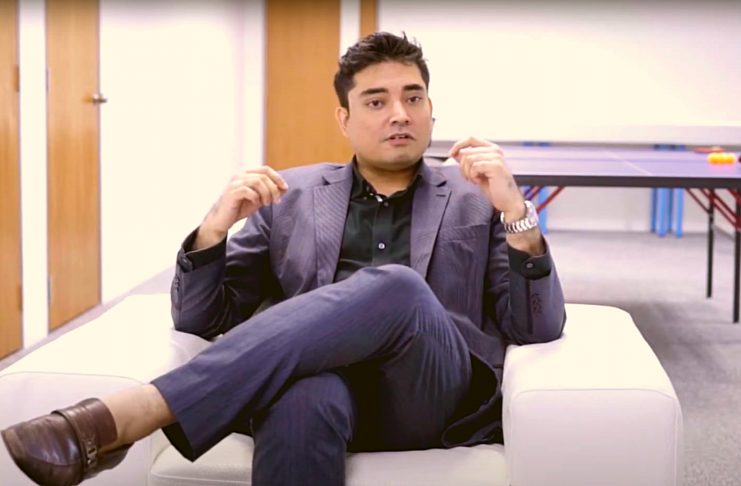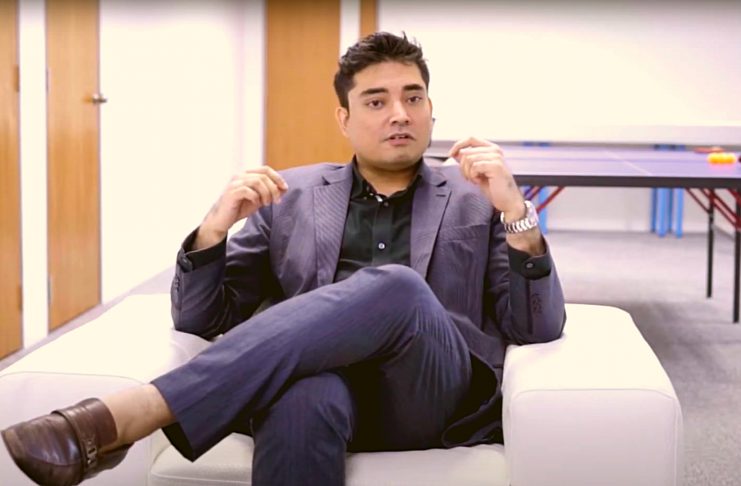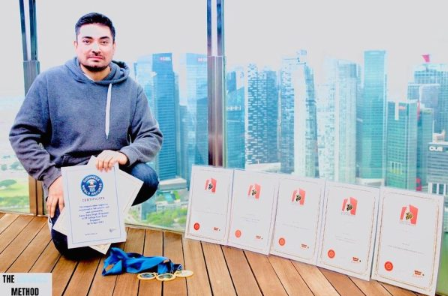Capitalizing on Success: Sancy Suraj’s Record-breaking Memory Feat
Sancy Suraj is a name that has become synonymous with record-breaking memory feats in Singapore. From reciting the most digits of pi to memorizing hundreds of capital cities in record time, Sancy’s memory skills are truly remarkable. As a memory coach, he has also helped countless individuals improve their memory skills and achieve their own goals. In this article, we had the opportunity to speak with Sancy about his latest record-breaking memory feat, the techniques he uses to memorize information effectively, his advice for those looking to improve their memory skills, and more.
Congratulations on your latest record-breaking memory feat! Can you tell us more about what you accomplished and how you were able to achieve this success?

Thank you! I’m thrilled to have set another record and I’m happy to share more about my latest memory feat. On Pi Day, March 14th, 2021, I successfully identified all 197 capital cities in just 7 minutes and 39 seconds, setting a new record for memory speed recall. This was a challenging feat that required a lot of mental focus, preparation, and practice, but I’m proud to have accomplished it.
To achieve this record, I utilized various memory techniques that I’ve developed and refined over the years as a memory coach. One technique I used was visualization, where I created mental images of each capital city and associated them with memorable objects or locations. For example, when I thought of London, the capital of England, I pictured the iconic clock tower of Big Ben. This technique helped me retain the information and recall it more quickly during the speed recall.
Another technique I used was the memory palace method, where I associated each capital city with a specific location or object within a familiar place, such as my house. For example, I associated New Delhi, the capital of India, with my kitchen sink. This technique helped me create a mental map of the information and made it easier to retrieve the data quickly.
In addition to these techniques, I also used a lot of repetition and practice to strengthen my memory recall. I spent hours each day studying and rehearsing the capital cities, using spaced repetition software to help me review the information at specific intervals. I also practiced the speed recall format to improve my speed and accuracy.
Overall, this record-breaking memory feat was a challenging but rewarding experience that required a lot of dedication and hard work. I hope to continue pushing the limits of what’s possible with the human memory and inspiring others to develop their own memory skills.
Memorizing large amounts of information quickly can be challenging. What techniques do you use to help you memorize information effectively, and how do you stay motivated during the process?
As a memory coach and record-holder, I’ve developed various techniques to help me memorize large amounts of information quickly and effectively. One of the most important techniques is visualization, where I create vivid mental images of the information I’m trying to remember. For example, if I’m trying to remember a list of names, I might associate each name with a memorable image or story. This technique helps me to retain the information more effectively and makes it easier to recall later on.
Another technique I use is the memory palace method, where I create a mental map of the information and associate each piece of information with a specific location or object within a familiar place, such as my house. This technique is particularly effective for memorizing lists or sequences of information, such as a deck of cards or a long string of numbers. By associating each piece of information with a specific location, I’m able to create a mental map of the data, making it easier to recall later on.
In addition to these techniques, I also use a lot of repetition and practice to strengthen my memory recall. I spend hours each day studying and rehearsing the information I’m trying to remember, using spaced repetition software to help me review the information at specific intervals. By reviewing the information regularly, I’m able to strengthen my memory recall and retain the information more effectively.
Staying motivated during the memorization process can be challenging, but I find that setting clear goals and celebrating small successes along the way helps to keep me motivated. For example, if I’m trying to memorize a long list of information, I might break it down into smaller chunks and celebrate each time I successfully memorize a chunk. This helps me to stay motivated and focused on the task at hand.
Overall, memorizing large amounts of information quickly requires a lot of hard work, dedication, and the use of effective memory techniques. By utilizing visualization, the memory palace method, and repetition, I’m able to strengthen my memory recall and retain the information more effectively. And by setting clear goals and celebrating small successes along the way, I’m able to stay motivated and focused on achieving my memory goals.
What role does practice and preparation play in achieving memory-related records and feats, and how do you structure your training to optimize your performance?
Practice and preparation play a crucial role in achieving memory-related records and feats. Like any skill, memory can be improved with consistent practice and training. In order to optimize my performance and prepare for record-breaking memory feats, I structure my training in a way that allows me to gradually increase the difficulty and complexity of the information I’m trying to memorize.
I typically start my training by focusing on basic memory techniques and building a strong foundation of memory skills. This might involve memorizing simple lists of information, such as names or numbers, and practicing visualization and other memory techniques to help me retain the information more effectively. As I become more comfortable with these basic techniques, I gradually increase the difficulty of the information I’m trying to memorize.
To prepare for a specific memory-related record or feat, I will typically spend months practicing and memorizing the specific type of information that I will need to recall during the record attempt. For example, if I’m preparing to recite the most pi digits, I will spend months memorizing and practicing reciting pi, gradually increasing the number of digits I’m able to recall.
In addition to regular practice and training, I also focus on maintaining a healthy lifestyle and staying mentally sharp. This includes getting enough sleep, eating a healthy diet, and engaging in activities that challenge my brain and help me stay mentally fit.
Overall, practice and preparation are essential to achieving memory-related records and feats. By gradually increasing the difficulty of the information I’m trying to memorize and focusing on building a strong foundation of memory skills, I’m able to optimize my performance and prepare for record-breaking memory attempts. And by maintaining a healthy lifestyle and staying mentally sharp, I’m able to stay focused and perform at my best.
“Memory feats are not just born from raw talent, but from consistent practice and preparation. The foundation of memory skills must be built first before attempting to break records. To optimize performance, one must gradually increase the difficulty of information and engage in activities that challenge the brain. It’s not just about memorizing, but also about maintaining a healthy lifestyle and staying mentally sharp. Remember, the key to breaking records is not just in your brain, but also in your habits.”
As a memory coach, what advice do you give to your clients who are looking to improve their memory skills and achieve their own memory-related goals?
As a memory coach, I often advise my clients to focus on building a strong foundation of memory skills through regular practice and training. This might involve practicing memory techniques such as visualization, association, and repetition, as well as engaging in activities that challenge the brain and help to improve memory function, such as puzzles, games, and learning new skills.
Another important aspect of improving memory skills is developing good habits and routines that support brain health and function. This might include getting enough sleep, eating a healthy diet, staying physically active, and managing stress levels.
In addition to these general tips and advice, I also work with my clients to develop personalized memory training programs that are tailored to their specific goals and needs. This might involve identifying specific areas of weakness in their memory skills and developing strategies to address those weaknesses, as well as setting achievable goals and milestones to track progress and maintain motivation.
Ultimately, the key to improving memory skills and achieving memory-related goals is consistent practice and dedication. By focusing on building a strong foundation of memory skills, developing healthy habits and routines, and working with a qualified memory coach or trainer, anyone can improve their memory and achieve their memory-related goals.
What other record-breaking or memory-related projects are you currently working on, and what are your goals for the future in this field?
As someone who is passionate about memory training and breaking records, I am always looking for new challenges and opportunities to push myself further. Currently, I am focusing on a number of different memory-related projects and goals, including developing new memory techniques and strategies, coaching and training others in memory skills, and continuing to break records and achieve new milestones in the field.
One of my current projects is working on a book that will provide a comprehensive guide to memory training and memory techniques. This book will be geared towards individuals who are looking to improve their memory skills, as well as coaches and trainers who work in the field of memory training. I am excited to share my knowledge and expertise in this area and hope that this book will help others to achieve their own memory-related goals.
In addition to writing a book, I am also focused on continuing to break records and achieve new milestones in the field of memory training. While I have already achieved several records in areas such as reciting pi digits and memorizing capital cities, I am always looking for new challenges and opportunities to push myself further. My ultimate goal is to continue to innovate and make breakthroughs in the field of memory training, and to inspire others to do the same.
Overall, I am excited about the future of memory training and am committed to continuing to push the boundaries of what is possible in this field. Whether through breaking records, coaching and training others, or developing new memory techniques and strategies, I am dedicated to helping people to unlock the full potential of their memory and achieve their goals.
“Memory is not just a skill, it’s a limitless power waiting to be harnessed. With every record broken, every technique mastered, we push the boundaries of what we once thought was impossible. The future of memory training is an unwritten story waiting for us to author, and our potential is limited only by our imagination.”
When asked about the techniques he uses to memorize information effectively, Sancy revealed that he relies heavily on visual memory and association techniques. He also stressed the importance of practice and preparation in achieving memory-related records and feats, explaining that he structures his training to optimize his performance. Sancy also provided valuable advice for those looking to improve their memory skills, emphasizing the need for regular practice and the importance of using techniques that work for the individual.
Looking to the future, Sancy shared his plans to continue pushing the boundaries of what is possible in the field of memory training. He is constantly seeking out new challenges and opportunities to test his skills and develop new strategies, and is committed to sharing his knowledge and skills with others.
Finally, what do you think sets memory athletes apart from others, and how do you continue to push the limits of what you are capable of when it comes to memory and record-breaking?

In my opinion, what sets memory athletes apart from others is their ability to tap into the full potential of their memory and use it to achieve incredible feats. While many people may believe that having a good memory is simply a matter of genetics, the truth is that memory can be trained and developed, much like any other skill. Memory athletes have devoted countless hours to training their minds and developing new memory techniques and strategies, allowing them to achieve extraordinary feats that might seem impossible to others.
In order to continue pushing the limits of what I am capable of when it comes to memory and record-breaking, I am constantly seeking out new challenges and opportunities to test my skills. Whether it is attempting to memorize a longer string of numbers or pushing myself to recall information even more quickly, I am always looking for ways to improve and take my skills to the next level.
At the same time, I recognize that there is always more to learn and discover when it comes to memory training. That is why I am constantly studying new research and techniques in this area, and working to develop new strategies and approaches that can help me to achieve even greater success in the future.
Ultimately, what drives me to continue pushing the limits of what I am capable of is a deep passion for memory training and a desire to share my knowledge and skills with others. I believe that memory training is a powerful tool that can help individuals to achieve their goals and unlock their full potential, and I am committed to continuing to push the boundaries of what is possible in this field, both for myself and for others.
“Memory athletes are not born with exceptional memory, they have simply unlocked the full potential of their minds through dedication and training. Their pursuit of pushing their memory limits knows no bounds, as they continuously seek new challenges and techniques to expand their abilities. Passion and a desire to share knowledge with others drive them to break records and achieve the seemingly impossible.”
Sancy Suraj is a true inspiration in the field of memory training. His record-breaking feats and dedication to his craft serve as a reminder that with practice and determination, we can all achieve extraordinary things. We thank Sancy for taking the time to share his insights and expertise with us, and we look forward to seeing what he will accomplish next.














